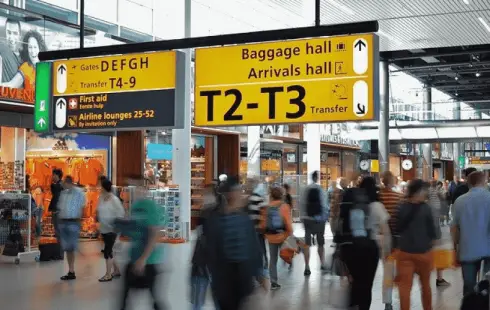
Oktoberfest in the news: How people around see beer's birthday
Section: Arts
 When people are deported to their home countries at BER Airport, they are usually there: Two deportation observers from the welfare organizations who take a look at the often tense situation and, if necessary, act as mediators. Last week, the Berlin-Brandenburg Deportation Monitoring Forum presented its report for 2020 and 2021.
When people are deported to their home countries at BER Airport, they are usually there: Two deportation observers from the welfare organizations who take a look at the often tense situation and, if necessary, act as mediators. Last week, the Berlin-Brandenburg Deportation Monitoring Forum presented its report for 2020 and 2021.
According to the Forum, there were around 30 percent fewer deportations from BER Airport in 2020 and 2021 overall than in 2019 - mainly due to the Corona pandemic. A total of 2670 people were deported from BER in both years, as well as previously from the old Schönefeld and Tegel airports. The deportation observers, who have been working full-time since 2021, accompanied 44 of the 56 collective deportations and 102 individual measures on scheduled flights during this period.
The result is initially positive for the federal police, who carry out the deportations at BER: "In the majority of all observed deportations, no special incidents occurred."
However, the observers also noted some problems. For example, interpreters were not present during all deportations, they said. On flights to the successor states of the former Soviet Union, interpreters were sometimes present for Russian, but not for the language of the destination countries, such as Moldovan or Kazakh.
The "lead state authorities", i.e. the authorities responsible for deportation in the states of Berlin and Brandenburg, are supposed to be responsible for the deployment of the interpreters. It often remains unclear what happens to people whose deportation fails at the last minute, for example because of a court order, and who then find themselves at the airport penniless but with a lot of luggage.
Andrea Johlige, a member of the Left Party who is usually critical of deportations, also said in response to a question from this newspaper, "The activity report shows that the efforts to professionalize deportations and make them as little stressful as possible for those affected have led to positive changes."
However, he said, the well-known problems of family separations, lack of language communication, restraints and use of physical restraint still have not been fully eliminated.
"Above all, additional psychological stress on children and families must be avoided at all costs, and family separations must not be allowed to occur," Johlige said. The fact that a young person is left behind alone in Germany, as happened in the case of a 16-year-old Armenian, must be prevented in the future.
Image by Rudy and Peter Skitterians

Section: Arts

Section: Business

Section: Business

Section: Arts

Section: Health

Section: Arts

Section: News

Section: News

Section: Arts

Section: Business
Health Insurance in Germany is compulsory and sometimes complicated, not to mention expensive. As an expat, you are required to navigate this landscape within weeks of arriving, so check our FAQ on PKV. For our guide on resources and access to agents who can give you a competitive quote, try our PKV Cost comparison tool.
Germany is famous for its medical expertise and extensive number of hospitals and clinics. See this comprehensive directory of hospitals and clinics across the country, complete with links to their websites, addresses, contact info, and specializations/services.
One of the most beautiful squares transforms into a summer stage every year for two days. The Gärtnerplatz Open-Air features a free music and cultural program across three stages, as well as street food from local vendors. On Saturday, the main stage at Gärtnerplatz offers something for everyone,...



No comments yet. Be the first to comment!